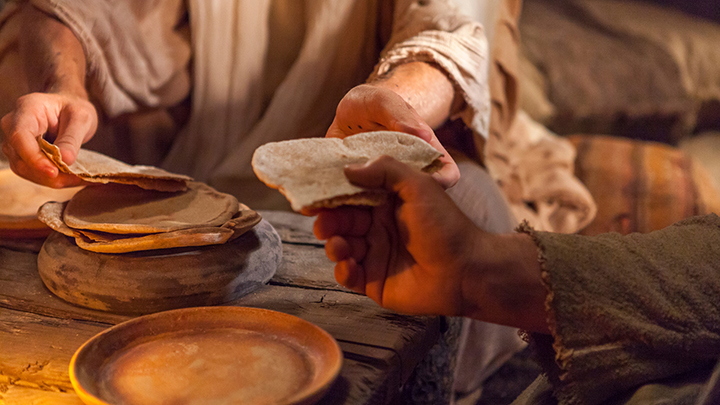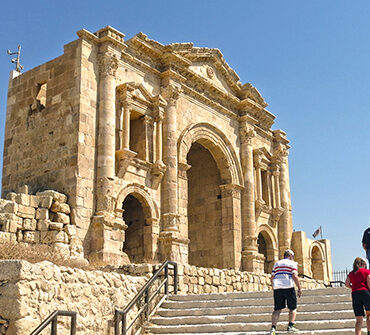
Jesus, the master of illustrative demonstrations, said, “I am the bread of life (Jn. 6:35, 48),” and “I am the living bread that came down out of heaven (Jn. 6:51),” suggesting a reference to the manna the Israelites received in the wilderness. During His last supper with His disciples, Jesus instituted the Holy Communion by taking bread, giving thanks, breaking it, and saying, “Take, eat; this is My body which is broken for you (1 Cor. 11:24).”
There is a familiar pattern here. Notice that Jesus always took, blessed, broke, and then distributed the pieces, signifying that bread that has been broken can feed more people than bread that has not. When He fed the multitudes with nothing more than a basket of fish and loaves, Jesus gathered back to Himself more than He sent out. In addition, in both of those instances, Jesus “commanded the multitude to sit down on the grass (cf. Matt 14:19; 15:35; Mk 6:39; 8:6; Lk 9:14; Jn 6:10).” Notice, Jesus didn’t suggest, or request, but commanded the people to be seated. This must have created a sense of anticipation. They had heard Him speak and saw Him heal every kind of sickness. Sitting on the grass, they were poised to participate in a miracle, watching the bread and fish multiply as they passed it to their neighbor. The seated position seems to signify the importance of being ready to receive from Him.
If we follow the bread in these stories, we can find similarities in the lives of those called into communion with the Lord. He takes us (receives us), blesses us, breaks us, sends us out into the world, and gathers (or receives) more than He began with.
He Takes Us
Whether you feel you have been chosen (cf.: Jn 6:44; 15:16; 15:19) or you answered a clarion call from the Lord (cf.: Acts 2:21; Rom 10:10-13), Jesus receives those who come to Him (cf.: Jn 6:37-39; 10:27-29) and claims them as His own with the expectation of permanence.
He Blesses Us
In the sequence demonstrated in these examples, the blessing comes before the breaking and after the receiving. Jesus prayed for His disciples in John 17 6-26 before His crucifixion and ascension. He gave thanks for them and all who would believe, just as He did the bread. He said, “They were yours, you have given them to me.” He knew the challenges His followers would face since they were in the world, but not of it. So, Jesus asked the Father to keep them unified (as one), knowing there is strength in numbers. He asked for their protection from “the evil one” and that His joy would be fulfilled in them.
He breaks Us
When we think about God and our relationship with Him, accepting the idea that He would do anything that inflicts pain is challenging. But in truth, nothing God does would be painful if we were not sinful. It is our incongruence with Him that causes discomfort.
God intends to strengthen our relationship with Him for our sake. So He takes us through a transformation process (Rom 12:2). In Hebrews 12:6-7 the writer reminds us that God corrects everyone He receives. He uses everything at His disposal to teach us that He is God and we are not. In other words, we learn that He has a plan for each of us and is in control of bringing it to fruition. So, in James 1:2-4, the writer reminds us that trials produce patience, and the work of patience produces perfection in us. What is perfection? Humility that fosters total trust in God.
Being broken by God is to be purged of anything that prevents us from being conformed to the image of His son (Rom 8:29), not just in terms of likeness but also in the quality of our relationship with Him.
He Sends Us Out
When Jesus fed the multitudes, He placed the pieces of bread in the hands of the disciples, who distributed them to the masses. In keeping with His desire to create unity among His people, God faithfully includes them in spreading the Word of God. Jesus reminds us that we work together to help each other mature. In Paul’s letter to Timothy, he wrote, “The things which you have heard from me in the presence of many witnesses, entrust these to faithful men who will be able to teach others also (2 Tim 2:2).” And in 1 Corinthians 3:6 Paul so eloquently said, “I planted, Apollos watered, but God gave the increase.” God provided more than enough. So, “They all ate and were satisfied (Matt 14:20).”
Ultimately, God wants us to be beacons of the faith so that others will see the light and be drawn to Christ. So Jesus said, “Go…and make disciples of all nations…(Matt 28:19).”
He Gathers More
From the beginning, God commanded humankind to “Be fruitful and multiply; fill the earth and subdue it “(Gen 1:28).” That command is still in force today. We see it in God’s promise to Abraham (Gen 22:17), the way He blessed the Hebrews in Egypt (Exodus 1:7), and even in the parable of the Talents (Matt 25:14-30). God is seeking who so ever will.
We are members of the Body of Christ (1 Cor. 12:27). As such, it is not difficult to see how the bread in the stories of the feeding of the 4000 and 5000 might be symbolic of the life journey of a believer. And in the end, God will be glorified in us.



